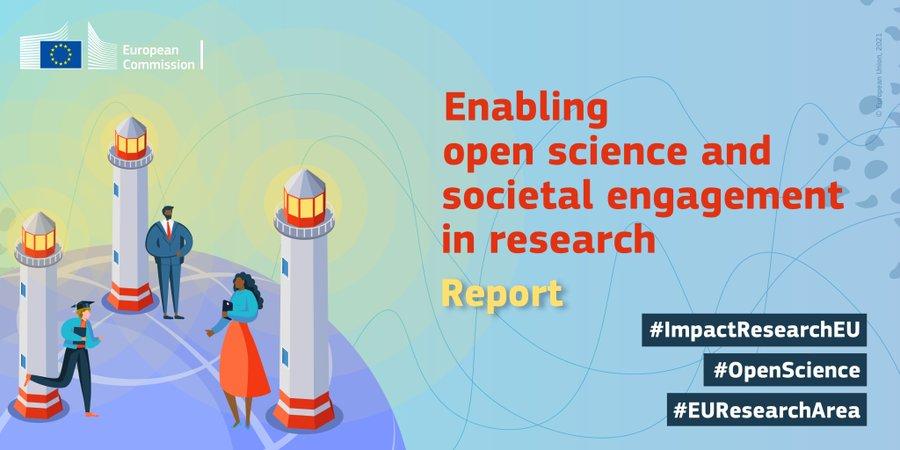
The European Commission has a strong ambition for open science and societal engagement in research to become common practice at universities and other research organisations within the European Research Area. To this end, an event was held this year to better understand the challenges involved in achieving this goal and effective ways to address these. A new report on enabling open science and societal engagement in universities and research organisations emerged from this discussion.
The event, held on 1 July of this year, involved 36 REA-managed Science with and for Society (SwafS) projects. Jointly organised by the European Commission DG Research and Innovation and the European Research Executive Agency (REA), the one-day workshop sought to provide answers on how the institutionalisation of open science could be enabled in universities. The event was attended by delegates from SwafS ‘Institutional Changes’ projects funded under Horizon 2020, and the first group of European University Alliances under the European Universities Initiative. The participants shared their experiences on how open science and societal engagement could be enabled to become the norm in research-performing organisations and universities in particular across the European Research Area.
The five key recommendations of the new report on enabling open science and societal engagement in research were:
- Universities and other research performing organisations should make reforms to criteria, metrics and processes underpinning researchers’ recruitment and career progression in order to reward open science practices.
- The institutionalisation of open science in universities and other research-performing organisations should be seen as a long-term project for which leadership, co-ordination, resources and training need to be provided.
- The European Commission, national policy makers and research funders, universities, and other research performing organisations should continue to make reforms to indicators, measures and processes utilised by them in all evaluations to ensure these include assessment and evaluation of open science practices.
- The European Commission and national research funders should also continue to improve criteria, metrics and methods that underpin research proposal evaluation processes so that they recognise and value open science and societal engagement.
- University ranking organisations should undertake substantial reforms to their ranking systems to reward open science practices.
The 86 SwafS projects managed by the REA have been instrumental in implementing institutional changes in universities and research organisations.
Check out this factsheet to find out more on the key changes they have introduced so far and their geographical spread.
Read below about six SwafS projects that have successfully contributed to implementing institutional changes.
Good practices in Research Funding and Performing Organisations (RFPOs)
RRI-Practice aimed to understand the challenges of implementing Responsible Research and Innovation (RRI) and to identify and support the best ways to facilitate the uptake of RRI in organisations and research programmes. The project, through its activities in 23 research organisations across the world, delivered 12 national reports, two comparative reports and a Handbook for Implementing RRI. In keeping with its policy recommendations, RRI-Practice, along with the NUCLEUS project, was a founder of the ‘Joint Declaration on Mainstreaming RRI across Horizon Europe’.
Setting up action plans
STARBIOS 2 promoted RRI through structural or institutional change in biosciences research organisations, a field undergoing rapid developments due to emerging social and ethical issues. Action plans are being put into place by partner institutions, helping to create a sustainable model and guidelines to foster the implementation of RRI in other research institutions. It developed an RRI model for the biosciences, with the potential to contribute to structural changes in bioscience institutions in Europe and beyond. These changes include the establishment of an open access policy at one of the RPOs, the setting up of an ethical commission at a higher education partner, and the creation of a start-up, InNutRes, to connect the university’s research to enterprises.
Training and education on RRI
ORION explored ways to embed open science in research funding organisations and focused on the life sciences and biomedicine. Changes introduced by ORION include establishing a working group dedicated to open science strategy, the appointment of public engagement officers and citizen science facilitators, research integrity committees, and new open data policies. It has also embedded RRI principles in its evaluation process. ORION developed a range of training resources for open science and designed tools for co-creation experiments. A booklet of inspiring stories highlights successes and learnings from activities conducted during the project.
Territorial governance
SeeRRI aimed to develop a framework for integrating the RRI approach into regional development policies in three European territories: Nordland in Norway; B30 in Catalonia and Ecoplus from Lower Austria. In Catalonia, the Universitat Autònoma de Barcelona has integrated the RRI approach in its institutional strategy. The governing board of the university has also adopted RRI as a framework for policy strategies and programming documents.
Gender equality
SUPERA is one of the many projects funded under Horizon 2020 that supports the implementation of Gender Equality Plans (GEPs), with six of its partners setting up and implementing GEPs in their respective organisations. SUPERA has also produced videos and successful social media campaigns. Some communication initiatives included raising awareness on resistance to gender equality and on gender-based violence in research and academia. In addition, SUPERA has supported the collection of gender-sensitive data.
GEARING ROLES, recently featured as Cordis project of the month, is implementing Gender Equality Plans (GEPs) in six organisations - five universities and one research funding organisation - with the goal of progressing towards gender equality measures. One of the project’s outcomes is a board game, Nobel Run, which tasks players with winning a Nobel Prize – with some help along the way from some of Europe (and the world’s) most prominent female scientists!
Details
- Publication date
- 9 December 2021
- Author
- European Research Executive Agency
